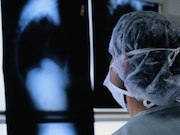Two studies evaluate use; one for breast cancer, the other for diabetic retinopathy
TUESDAY, Dec. 12, 2017 (HealthDay News) — A deep learning algorithm can detect metastases in sections of lymph nodes from women with breast cancer; and a deep learning system (DLS) has high sensitivity and specificity for identifying diabetic retinopathy, according to two studies published online Dec. 12 in the Journal of the American Medical Association.
Babak Ehteshami Bejnordi, from the Radboud University Medical Center in Nijmegen, Netherlands, and colleagues compared the performance of automated deep learning algorithms for detecting metastases in hematoxylin and eosin-stained tissue sections of lymph nodes of women with breast cancer with pathologists’ diagnoses in a diagnostic setting. The researchers found that the area under the receiver operating characteristic curve (AUC) ranged from 0.556 to 0.994 for the algorithms. The lesion-level, true-positive fraction achieved for the top-performing algorithm was comparable to that of the pathologist without a time constraint at a mean of 0.0125 false-positives per normal whole-slide image.
Daniel Shu Wei Ting, M.D., Ph.D., from the Singapore National Eye Center, and colleagues assessed the performance of a DLS for detecting referable diabetic retinopathy and related eye diseases using 494,661 retinal images. The researchers found that the AUC of the DLS for referable diabetic retinopathy was 0.936, and sensitivity and specificity were 90.5 and 91.6 percent, respectively. For vision-threatening diabetic retinopathy, the AUC was 0.958, and sensitivity and specificity were 100 and 91.1 percent, respectively.
“In this evaluation of retinal images from multiethnic cohorts of patients with diabetes, the DLS had high sensitivity and specificity for identifying diabetic retinopathy and related eye diseases,” Ting and colleagues write.
Several authors from the Bejnordi study disclosed financial ties to the pharmaceutical and medical device industries. Several authors from the Ting study hold patents related to the deep learning system used in the study.
Abstract/Full Text – Benjordi (subscription or payment may be required)
Abstract/Full Text – Ting (subscription or payment may be required)
Editorial (subscription or payment may be required)
Copyright © 2017 HealthDay. All rights reserved.








